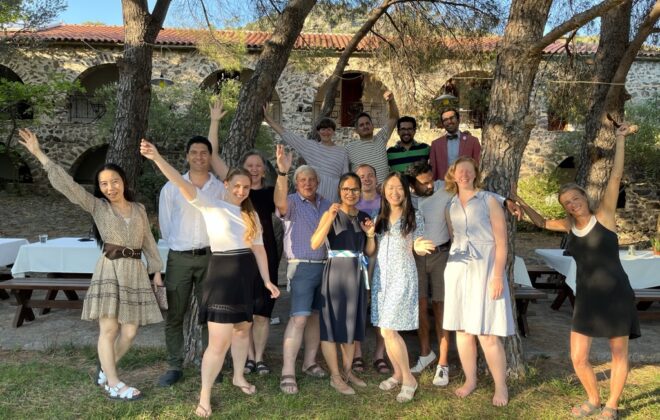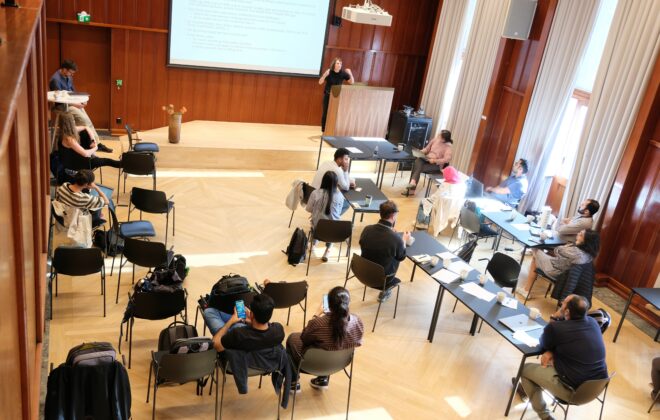Including RRI in the development and implementation of Horizon Europe
As Horizon Europe is entering its final stages of shaping, there are still some open questions regarding how RRI will be implemented in this upcoming framework programme for research and innovation.
As project leader of AFINO, I am also part of the project “RRI in Horizon Europe”, dedicated to promoting the importance of RRI and to help show how RRI can be implemented properly. The following text is a position paper developed by the core group – project leader Ellen-Marie Forsberg, Alexander Gerber and myself. The paper is intended to be shared widely and will be sent to a number of stakeholders that are important for promoting the RRI agenda in Horizon Europe.
It has previously been posted also at the project webpage of RRI in Horizon Europe, and as a blog post on the webpage of the EU project RRI Tools.
Position paper:
Including Responsible Research and Innovation (RRI) in the development and implementation of Horizon Europe
By E.-M. Forsberg, A. Gerber and S. G. Carson (February 2020)
Why RRI in Horizon Europe?
The European Union has an ambition to be a global leader in sustainable and value-driven research and innovation. The European Union, including the upcoming framework programme Horizon Europe, builds upon the United Nations’ Sustainable Development Goals and has committed to the European Green Deal, where “the full range of instruments available under the Horizon Europe programme will support the research and innovation efforts needed”.
It is stated that:
“Conventional approaches will not be sufficient. Emphasising experimentation, and working across sectors and disciplines, the EU’s research and innovation agenda will take the systemic approach needed to achieve the aims of the Green Deal. The Horizon Europe programme will also involve local communities in working towards a more sustainable future, in initiatives that seek to combine societal pull and technology push”.
European Commission, Communication about the European Green Deal, 2019
Responsible Research and Innovation (RRI) is an approach that can support this agenda.
RRI refers to an approach rolled out in Framework Programmes 7 & 8 emphasising the on-going process of aligning research and innovation to societal values, needs and expectations. RRI guides researchers/innovators and research/innovation conducting and funding organisations in anticipating the implications of their work, including citizens and stakeholders upstream, and reflecting and responding on society’s values and concerns. In this way, co-design and co responsibility for the outcomes of the research and innovation can be facilitated, increasing societal uptake and acceptability of research and innovation. The last decade of the RRI agenda also provides important resources for operationalizing the Open Science agenda in its broad sense, beyond Open Access and Open Data, and the co-creation and citizen science agendas. Experiences from the concluded and ongoing RRI projects (in total 2633 were tagged as RRI projects by January 2020) should thus inform research and innovation investments as they will be outlined in the first Strategic Plan for Horizon Europe, including the sub-chapters on more specific actions.
RRI can
- make research and innovation more societally legitimate, when it is developed in line with societal values
- help research and innovation be an instrument for meeting the sustainability goals
- in this way ensure broader societal support for research and innovation investments that are necessary to keep Europe as a competitive region globally
Making RRI more visible in Horizon Europe – practical measures
RRI is included in Horizon Europe as operational objective 2 (c) (article 2 of the Specific programme implementing Horizon Europe: promoting responsible research and innovation, taking into account the precautionary principle.
Recital 26 of the regulation for Horizon Europe states:
“With the aim of deepening the relationship between science and society and maximising benefits of their interactions, the Programme should actively and systematically engage and involve citizens and civil society organisations in co-designing and co-creating responsible research and innovation agendas and contents, promoting science education, making scientific knowledge publicly accessible, and facilitating participation by citizens and civil society organisations in its activities. It should do so across the Programme and through dedicated activities in the part ‘Strengthening the European Research Area”.
The document Orientations towards the first Strategic Plan for Horizon Europe also gives a mandate for RRI:
“Engaging and involving citizens, civil society organisations and end-users in co-design and co-creation processes and promoting responsible research and innovation will improve trust between science and society, and the uptake of scientific evidence based public policies and innovative solutions.”
These mandates must be followed up with concrete actions, in essence:
RRI should be specifically outlined as a requirement of research and innovation in each programme line of Horizon Europe and should be funded as a research and innovation action on its own terms in Reforming and Enhancing the European R&I system.
This means:
- Drafting committees of each programme line should at an early point consider what RRI measures are appropriate for their respective programmes. The level of integration of RRI aspects should be proportional to the potential societal implications of the research and innovation funded in the lines. RRI should be included as assessment criteria and KPls in (i) the agenda-setting for the Work Programmes; (ii) the definition of calls and guidance for applicants; (iii) the review process and grant agreements; (iv) the monitoring processes and (v) impact evaluation.
- Budgets must be devoted to RRI actions in projects funded under each programme line.
- In this work, the drafting committees should consider seeking the support of RRI experts, who can (before a European network is formed) be found among the major Horizon 2020 RRI projects (see for instance htt ps:/ / www.rri-pract ice.eu/ part icipant s-and-net works/ aff iliat ed networks-and-relat ed-project s/ ). In the running of Horizon Europe such a support system should be organised as a permanent structure.
- It must be clear that citizen science, open science and co-creation are aspects of RRI, but responsibility in research and innovation also includes being anticipatory, inclusive, reflexive and responsive, and includes considerations of ethics, fairness (social, gender, etc.) and sustainability. Open science, citizen science and co-creation agendas should be considered in this broader perspective and reference to RRI should be made.
- In order to maintain the investment in RRI competence from Horizon 2020, to be used for high quality RRI engagement in Horizon Europe, a dedicated space (with an appropriate budget) for RRI competence building and further research should be allocated to Reforming and Enhancing the European R&I system, together with citizen science and open science.
- A hub on RRI should be funded by the EC in order to ensure quality in the mainstreaming of RRI, co-creation, public engagement and citizen science in the whole framework programme. This hub should build on and further cultivate the RRI knowledge base. It should advise, train, consult, assess and provide quality control, and be a resource for those who include RRI related activities in Horizon Europe programmes and projects. It should also provide experts for the assessment of these aspects of research and innovation proposals and project activities, and for relevant committees and boards.
- There should be RRI NCPs from each Member State, which should guide and assess the operationalisation of RRI in Horizon Europe, to allow for learning processes at programme and project levels.
These recommendations build on evidence and experiences from previous projects on RRI and public engagement, and on extended dialogues with RRI experts, funders and policy makers.

Siri Granum Carson
Siri Granum Carson is centre director of AFINO. You can read more about Siri on AFINO's webpage.
Related Posts
3 Comments
Comments are closed.





Thank you for sharing your info. I truly appreciate your efforts
and I am waiting for your next write ups thank you once again.
Hello! I could have sworn Ive been to this website before but after browsing through some of the post I realized its new to me. Nonetheless, Im definitely happy I found it and Ill be book-marking and checking back frequently!
As a newbie to the internet, this info has proved to be particularly helpful. Thanks!